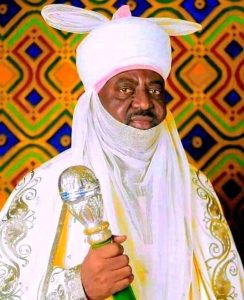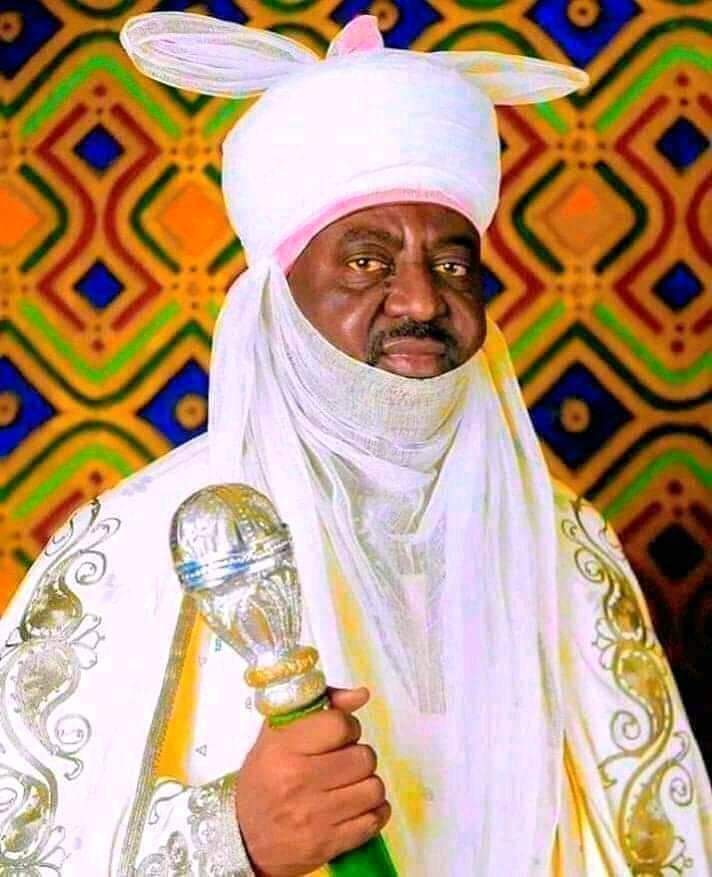The traditional rulers of Nigeria’s predominantly Muslim northern regions are known as emirs, and the titular sovereign of their now-defunct empire is formally styled as Amir-al-Muminin, Sultan of Sokoto (or Sarkin Musulmi in the Hausa language). The emir of Kano leads the Tijaniyya sufi order in Nigeria, which is historically the second most important Muslim position in Nigeria after the Sultan of Sokoto, who leads the more populous Qadiriyya sufi order.
In the northern Muslim states, the English word emir is commonly used, but names in the local languages include Sarki, Shehu, Mai, Etsu, and Lamido.

In this article, we will rank Nigeria’s many emirs according to their level of respect within the Caliphate.
10. The Emir of Ilorin
While most people do not consider Ilorin to be in the “core north,” it is an important town in Northern Nigeria. With a large Yoruba and Baruba population, the Emirate remained an important part of the Islamic Jihad of 1804 when Abdusalami dan Salih Alimi, a local Fulani, became Emir in 1824.
When the British arrived, they considered the Emir of Ilorin to be one of the top ten Emirs in northern Nigeria, a position that the Emirate still holds to this day.
Ibrahim Sulu Gambari, the current Emir of Ilorin, is a well-respected Nigerian lawyer and monarch who was appointed in 1995 as the 11th Emir of the Ilorin Emirate in Kwara State from the Fulani ruling house and chairman of Kwara State Traditional Councils. He is one of northern Nigeria’s top ten Emirs.
9. Etsu Nupe
Etsu is a Nupe word for “King,” which means that the Etsu Nupe is the ruler of all Nupe people, with headquarters in Bida. As a result, the Emir of Bida is ranked ninth among northern Nigeria’s Emirs.
Following the demise of the predecessor of the Nupe Kingdom, Bida Emirate was absorbed into Gwandu Emirate, the administrative capital of Sokoto Sultanate. In 1835, Usman Zaki dan Malam Dendo, a local Fulani, was appointed as the first Emir of the Nupe Emirate.
Alhaji (Dr) (Brig. Gen) Yahaya Abubakar rtd GCFR is the current Etsu Nupe. He is a retired soldier, elder statesman, and Chairman of the Niger State Traditional Council of Chiefs, making him one of the most respected Emirs in northern Nigeria.
8. Emir of Bauchi
Prior to the Islamic Jihad of 1804, Bauchi was ruled by small independent tribes. This changed in 1805 when Yakubu I dan Dadi, a student of Shehu Dan Fodio, became the first Emir of Bauchi, titled Lamido. Because of this, the Emirate is now known as ‘Bauchin Yakubu,’ after its founder.
The Emirate is still one of the top ten emirates in Northern Nigeria, a position it has held since the arrival of the British.
Dr Rilwan Suleiman Adamu, the Emir, is the son of the former Emir, Sulaiman Adamu, who died in 2010 after ruling for 28 years. The Emir is the Chairman of the Bauchi State Council of Traditional Rulers, which is no easy feat given the state’s other historic Emirates, such as that of Katagum Jama’are, who is one of northern Nigeria’s longest-serving Emirs.
7. Emir of Zazzau
Zazzau is one of the original Hausa Bakwai states established by Bayajidda and governed by his sons. The Emirate is significant and has a long history. Some of the most historic rulers of Zazzau Emirate include Queen Amina, the female warrior queen, Sarki Makau, Sarki Jatau, and others.
Apart from being one of the top ten emirates in northern Nigeria, the Emirate of Zazzau has a complicated history, with the Emir of Zazzau emerging from one of the four ruling Houses: Katsinawa, Mallawa, Bare-bari, and Sullubawa. The current Emir, Alhaji Ahmad Nuhu Bamalli, is the first Mallawa ruler in 100 years.
The Emirate is ranked high among the top Emirs in the region. Being located in the capital of Northern Nigeria at the time gave the Emir great prestige. The Emir at the time, Ja’afaru Dan Isiyaku, was even a member of the Northern Regional House of Chiefs and a minister without portfolio, demonstrating his standing among northern Emirs.
6. Emir of Katsina
The Emirate of Katsina is one of the oldest emirates in northern Nigeria, and the Emir is also one of the top ten Emirs in the country.
When Shehu Usman Danfodio handed the flag to Ummarun Dallaje, patriarch of the Dallazawa Dynasty, the emirate became part of the Sokoto Sultanate. The current Emir is a descendant of the ruling Sullubawa dynasty, which was established in 1906 when Muhammadu Dikko became the ninth Fulani emir.
The Emir of Katsina is at the top of the list of northern Nigeria’s Emirs. He is also the Chairman of the State Traditional Council of Chiefs and the Emir who controls the majority of Nigeria’s District Heads.
5. Lamido of Adamawa
The Lamido of Adamawa stands tall in the history of Northern Nigerian Emir rankings. The Adamawa Emirate was formerly located in the Fombina area, but is now spread across Adamawa, parts of Taraba, and parts of Cameroon and Chad. Back then, it was one of the largest Emirates.
Modibo Adama, a disciple of Shehu Dan Fodio when he defeated the Mandara Kingdom, founded the Emirate in 1809. He reigned for nearly 40 years before being succeeded by his children, a practice that continues to this day.
Because of his power, the Lamido was regarded as one of the top ten Emirs in northern Nigeria, even by his peers. Aliyu Musdafa Barkindo, the most famous Lamido, ruled for 57 years and died in 2010 at the age of 88. Over 20 state governors and a slew of other dignitaries attended his funeral. Muhammadu Barkindo Aliyu Mustapha, the 12th Lamidon Adamawa, succeeded him. He is the Chairman of the State Chiefs Council.
4. Emir of Kano
During the Islamic Jihad, the current Emirate of Kano was established in 1805. Kano, one of the original Hausa states, had existed since 999, when Bagauda became the first King of Kano. The Kano emirate also defeated the British in three battles before falling in 1903 and sending then-Emir Aliyu Babba into exile.
Kano Emirate has since grown to become one of Nigeria’s most important emirates. While the Emir of Kano is one of the most well-known and senior Emirs in northern Nigeria, he is not the most senior. The Emir honors the Sultan of Sokoto, who remains the supreme ruler. This is not to say that the Emir is not one of the top ten Emirs in Northern Nigeria.
Kano state was the only other state with a single Emirate before the creation of four new Emirates in the state, aside from Sokoto. The state now has five First Class emirates. The late Ado Bayero, the 13th Fulani Emir, was one of Nigeria’s longest-serving and most respected Emirs, ruling for 52 years.
3. Emir of Gwandu
It may come as a surprise, but the Emir of Gwandu is one of the top three Emirs in northern Nigeria. While this Emirate is less well-known than others on the list, it is no less significant. The emirate is one of two capitals of the Sokoto Emirate, the other being Sokoto itself. It is located in present-day Gwandu, Kebbi state.
Following the Jihad, Dan Fodio split the sultanate between his son Muhammadu Bello and his brother Abdullahi. Gwandu was the eastern capital at the time, to which several Emirs reported and paid homage.
While the state is still the traditional capital as well as the Kingdom of Kebbi, it has lost much of its luster. The Emirate is currently embroiled in a legal battle over who will succeed the 19th Emir of Gwandu, Alhaji Mustafa Haruna Jokolo, who was deposed in 2005. The Supreme Court will hear the final case in 2023.
2. Shehu of Borno
The Borno Emirate is the second in northern Nigeria’s emirate hierarchy. The Borno Emirate was established at the beginning of the twentieth century to succeed the Bornu Empire, which had existed since 1000.
El-Kanemi, the current ruling dynasty, is descended from Muhammad El-Kanemi, who ruled between 1809 and 1837. In the Islamic Jihad, the Borno Empire has never been defeated. Borno has been a center of Islamic learning since the 17th century, when Islam was introduced to the region.
Abubakar Ibn Umar Garbai El-Kanem, the current Shehu of Borno, is a descendant of the Emirate’s founder, El-Kanemi. He has been on the throne since 2009 and is one of northern Nigeria’s highest-ranking emirs, second only to the Sultan himself. The Shehu is also the Deputy President General of the Nigerian Supreme Council of Islamic Affairs (NSCIA), Nigeria’s highest Islamic organization, and the Deputy Chairman of the Northern Traditional Rulers Council.
1. Sultan of Sokoto
The Sultan of Sokoto, also known as “Sarkin Musulmi,” is the most powerful Emir in northern Nigeria and the spiritual leader of the country’s nearly 100 million Muslims. This makes him the most powerful Emir in northern Nigeria, as well as the highest in the hierarchy of Emirs. The Sultan is also the President of the Jama’atu Nasril Islam (Society for the Support of Islam – JNI), the President of the Nigerian National Supreme Council for Islamic Affairs (NSCIA), and the Chairman of the Northern Traditional Rulers Council.
Muhammadu Sa’ad Abubakar, the current Sultan, succeeded his brother, Muhammad Maccido, who died in a plane crash in 2006. He is the son of Abubakar Sadiq III, the 17th and longest-reigning Sultan of Sokoto. They are descended from Usman Dan Fodio, the founder of the Sultanate of Sokoto.
The Sultan is the most powerful traditional ruler in northern Nigeria and throughout Nigeria. He is well-liked by people from all walks of life.
Conclusion
As previously stated, all of the Emirs in northern Nigeria are powerful and well-respected in their respective communities. However, according to the Emirs of Northern Nigeria, these are the top ten. They have a lot of clout and are well-liked.
